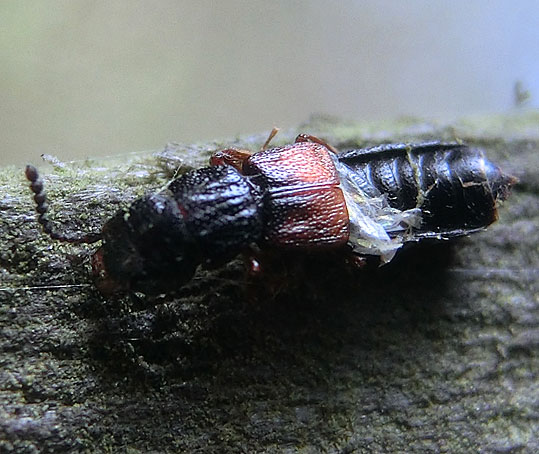
Noch keine Informationen verfügbar.
(1) Oxytelus insecatus Gravenhorst, 1806
Styloxis insecatus (Gravenhorst, 1806)
Anotylus insecatus (Gravenhorst, 1806)
Körperlänge 4 bis 5 mm. Clypeus glänzend und nur spärlich
punktiert. Kopf, Prothorakalschild und Hinterleib schwarz oder
schwarzbraun. Antennen dunkelbraun. Flügeldecken meist
orange-braun, aber proximal schwarz oder dunkelbraun. Beine
orangebraun, Oberschenkel meist an der Oberseite dunkler.
Die Imagines erscheinen von April bis Juni. Die Biologie der
Art ist nur bruchstückhaft bekannt: Larven und Imagines halten
sich häufig in Verbindung mit sich zersetzendem
Pflanzenmaterial (Totholz, Kompost- und Laubhaufen) am Boden
und auch unterirdisch (z. B. in verrottenden Wurzeln) auf, wo
die Weibchen auch die Eier in kleinen Gelegen zu etwa 5-6
Eiern ablegen. Die Eier besitzen nur ein dünnes Chorion
(Pietrykowska-Tudruj & Staniec 2009) und sind deshalb wohl
auf die feuchte Umgebung im verrottenden Pflanzenmaterial
angewiesen. Sowohl die Larven als auch die Imagines machen
vermutlich Jagd auf Dipterenlarven, die ebenfalls im
Pflanzenmaterial leben (Campbell und Tomlin 1983). Es ist
unklar, ob es eine besondere Räuber-Beute-Beziehung zwischen
Anotylus insecatus und Dipterenarten gibt, die sich von
Zwiebeln, Tulpen und Radieschen ernähren. Majka und
Klimaszewski (2008) berichten, dass sie Anotylus
insecatus-Imagines auf der Jagd nach Fliegenmaden (Gattung
Delia) in den Gängen gefunden haben, die diese Maden in die
Wurzeln von Rettich (Raphanus sativus) bohren. Die Verpuppung
und die Bedingungen der Überwinterung sind bislang noch nicht
erforscht.
Die Art ist in Europa weit verbreitet. In Deutschland ist die
Art ebenfalls weit verbreitet, aber keine häufige Art. Sie
wurde versehentlich in Nordamerika eingeschleppt,
wahrscheinlich mit importierten Pflanzenprodukten (Campbell
und Tomlin 1983; Webster et al. 2012).
Majka CG, Klimaszewski J. 2008. Adventive Staphylinidae (Coleoptera) of the Maritime Provinces of Canada: further contributions. ZooKeys 2, 151-174.
Pietrykowska-Tudruj E, Staniec B. 2009. The egg and mature larva of Anotylus insecatus (Gravenhorst, 1806) (Coleoptera: Staphylinidae). Genus 20, 209-223.
Webster RP, Sweeney JD, DeMerchant I. 2012. New Staphylinidae (Coleoptera) records with new collection data from New Brunswick, Canada: Scaphidiinae, Piestinae, Osorinae, and Oxytelinae. ZooKeys 186, 239-262.